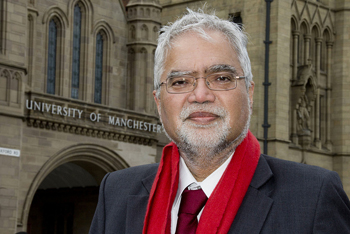
Mukesh Kapila
For Mukesh Kapila, the first-ever conference convened by the USC Shoah Foundation Center for Advanced Genocide Research this November will be an opportunity to join his colleagues from all over the world in supporting each other and making progress in their field.
Mukesh Kapila, CBE is Professor of Global Health and Humanitarian Affairs at the University of Manchester. He is also Special Representative of the Aegis Trust for the prevention of crimes against humanity, and Chair of Minority Rights Group International.
Previously he was Under Secretary General at the International Federation of Red Cross and Red Crescent Societies, the world’s largest humanitarian and development network. Earlier, he served the United Nations in different roles as Special Adviser to the United Nations High Commissioner for Human Rights in Geneva and then Special Adviser at the UN Mission in Afghanistan. Subsequently, he led the UN’s largest country mission at the time as the United Nations Resident and Humanitarian Coordinator for the Sudan, and then became a Director at the World Health Organization.
The inaugural conference of the USC Shoah Foundation Center for Advanced Genocide Studies, Memory, Media, and Technology: Exploring the Trajectories of Schindler’s List, will be a collaboration between the Center and USC Shoah Foundation. The conference, which marks the 20th anniversary of Schindler's List and USC SF, will examine the trajectories of memory, media, and technology in multiple forms and venues and from the vantage of a range of disciplines.
At the conference, Kapila will participate in the roundtable discussion “Future Directions: Genocide Studies and Digital Media Archives” along with Andi Gitow from the UN, Victoria Sanford from CUNY, and Zachary Kaufman from Harvard and Yale.
Kapila said the timing of the conference – just seven months after Kwibuka20, Rwanda’s 20th anniversary commemoration of the Rwanda Tutsi Genocide, and a year before the 100th anniversary of the Armenian Genocide – provides an opportunity for the participants to take a critical look at the effectiveness of their work in genocide research, intervention and prevention.
He hopes the conference opens up discussion around three major themes. First, he wants to discuss how to build non-Western countries’ capacity for studying genocide and taking steps to prevent it.
“Too often this subject is seen as being driven by the West, though advocacy groups, museums, memorials, et cetera,” Kapila said. “We need to determine how we can do better outreach in developing countries, Africa and even Asia, which is getting very powerful in setting the global agenda.”
Next, he wants to explore how we are learning from genocides of the past and applying those lessons to current conflicts that have the potential to turn into genocide.
Finally, Kapila hopes to address impunity after genocide. Holding perpetrators accountable is often not enough of a priority after the violence is over, he said.
“In peace-building and negotiations, the justice and accountability side is often seen as an inconvenience,” he said. “We need to rejuvenate that discussion and take a strong approach.”
Nothing moves people more, Kapila said, than the testimonies of people who have survived or witnessed genocide. Though current techniques of collecting testimony are not especially practical for ongoing conflicts, he said another discussion worth having at the conference is how to begin gathering testimonies from people who are in the middle of genocide and other crises.
Kapila said the conversations and partnerships that develop should continue even after the conference is over. With such a diverse group of participants, there is the potential for unique multimedia projects to emerge and for new research questions to be posed. Ultimately, he said he’ll consider the conference a success if he leaves feeling strengthened, empowered, and engaged in fruitful dialogue with his colleagues around the world, who often don’t have the opportunity to meet face to face.
“It can be a lonely business,” Kapila said. “I think coming together is an important act of solidarity.”